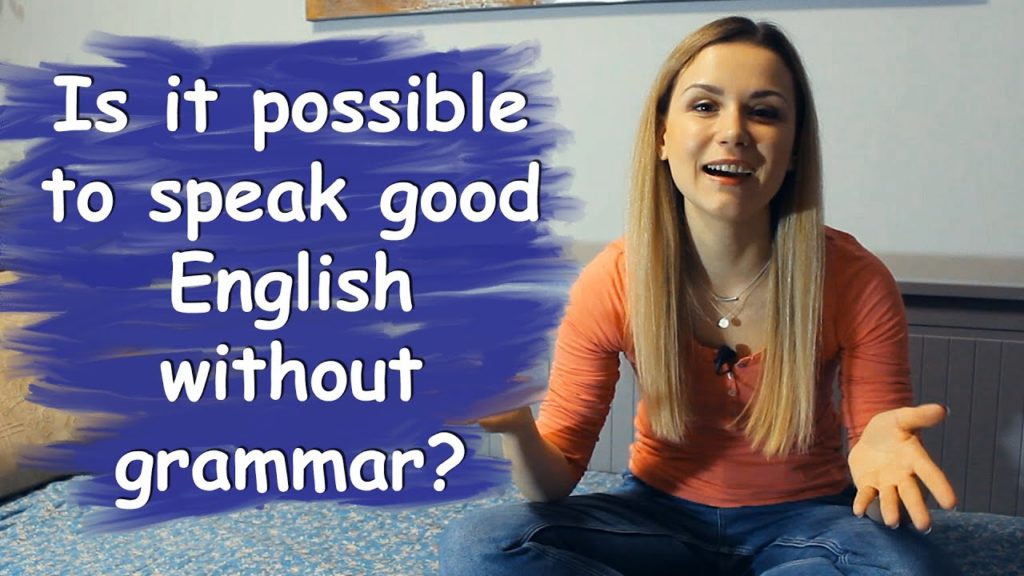Neste vídeo do canal English Fluency Journey, Anna Khoma explica o papel do estudo da gramática para o domínio da língua inglesa. Anna é ucraniana e como vocês poderão constatar, seu inglês e sua pronúncia são perfeitas, é praticamente impossível distinguir seu sotaque do sotaque de um americano nativo.
Em seu canal existem dezenas de outros vídeos muito interessantes em que nos transmite aspectos de sua muito bem sucedida experiência no aprendizado da língua inglesa.
Conheça também o perfil no Instagram da Anna.
| Audio | |
|---|---|
Normal | Slow |
| English Transcript | Tradução |
| Hey guys! Welcome back to the English Fluency Journey. I'm Anna. | Ei pessoal! Bem-vindo de volta ao English Fluency Journey. Eu sou a Anna. |
| And today I want to give you my take on such a hot topic, which is: Can you speak English without grammar? | E hoje quero falar sobre um assunto tão quente, que é: você consegue falar inglês sem gramática? |
| Can you speak good English without grammar and without learning grammar rules intentionally? | Você consegue falar um bom inglês sem gramática e sem aprender intencionalmente as regras gramaticais? |
| And I'll tell you right away this is not my case. | E eu te digo de cara que esse não é o meu caso. |
| I have learned grammar separately and intentionally. | Eu aprendi gramática separadamente e intencionalmente. |
| And I don't have an intention to speculate on this topic but I do have some thoughts that I want to share. | E não tenho a intenção de especular sobre esse tópico, mas tenho algumas ideias que gostaria de compartilhar. |
| And I think that it is very much possible for non-native speakers to speak good English and not to learn grammar rules. | Eu acho que é muito possível para falantes não-nativos falar inglês bem sem aprender regras gramaticais. |
| But when I say not learning grammar rules I mean not to sit, memorize and drill them; I don't mean ignore the rules. | Mas quando digo que não aprendemos regras gramaticais, eu quero dizer que não é sentar, memorizar e praticar; eu não estou falando para ignorar as regras. |
| Here's the thing, if you asked just some random native speakers about tenses, all those grammar rules, how to ask questions, auxiliary verbs, phrasal verbs and word order in those. | Aqui está a questão: se você perguntar a alguns falantes nativos aleatórios sobre tempos, todas essas regras gramaticais, como fazer perguntas, verbos auxiliares, verbos frasais e ordem das palavras. |
| They would probably just tell you "Back off man! I'm just simply speaking English. I don't know how to explain these things and I don't need to". | Eles provavelmente diriam "Sai fora, cara! Estou apenas falando inglês. Não sei como explicar essas coisas e não preciso". |
| And that's true they don't need to unless they're teachers. | E é verdade que eles não precisam, a menos que sejam professores. |
| And you don't need to know how to explain all these things and learn them by heart unless you're a teacher. | E você não precisa saber como explicar todas essas coisas e aprendê-las de cor, a menos que seja professor. |
| I think that you just have to understand them and be able to use them naturally without even thinking. | Eu acho que você só precisa entendê-las e ser capaz de usá-las naturalmente sem nem pensar. |
| Do native speakers speak perfectly, grammatically absolutely correct? No. | Os falantes nativos falam perfeitamente, de forma gramaticalmente absolutamente correta? Não. |
| Within every language there's a literary language that you can find only in books. | Em cada idioma, há um tipo de idioma literário que você encontra apenas nos livros. |
| There are rules for writing and formal writing. | Existem regras para redação e redação formal. |
| When you're writing an essay for college you want to stick to the rules of formal writing, you have to know grammar. | Quando você está escrevendo um ensaio para a faculdade, deseja seguir as regras da escrita formal, precisa conhecer a gramática. |
| But when you're texting someone or writing a post on Instagram, you don't want it to be too formal. | Mas quando você está mandando mensagens para alguém ou escrevendo uma postagem no Instagram, não quer que seja muito formal. |
| You want it to be casual. | Você quer que seja casual. |
| And that is an informal - spoken language. | E essa é uma linguagem informal - falada. |
| It's the way that people communicate. | É assim que as pessoas se comunicam. |
| And sometimes they use phrases that are grammatically incorrect. | E, às vezes, eles usam frases gramaticalmente incorretas. |
| Because how many times have you heard from native speakers: | Porque quantas vezes você ouviu de falantes nativos: |
| "This is the way we say this", "This is the way people speak" | "É assim que falamos", "É assim que as pessoas falam" |
| "Yes, it is grammatically incorrect and when you say this phrase grammatilly correctly it sounds weird to us and too formal." | "Sim, é gramaticalmente incorreto e quando você diz essa frase gramaticalmente correta, soa estranho para nós e formal demais". |
| Now, think about yourself and your native language. | Agora, pense em você e em seu idioma nativo. |
| I bet that you don't know how to explain a lot of grammar rules and I bet that you don't even know a lot about them. | Aposto que você não sabe explicar muitas regras gramaticais e aposto que você nem sabe muito sobre elas. |
| And yet, still, you don't have problems with expressing yourself. | E ainda assim, você não tem problemas em se expressar. |
| You may not even be grammatically correct sometimes, but I think that's not a problem at all. Right? | Você pode nem estar gramaticalmente correto às vezes, mas acho que isso não é um problema. Certo? |
| Yes, of course, we, and native speakers of English, went to school and have learned all these things a long time ago. | Sim, é claro, nós e falantes nativos de inglês, fomos à escola e aprendemos todas essas coisas há muito tempo. |
| But let's talk about children, preschoolers. | Mas vamos falar sobre crianças, pré-escolares. |
| They haven't learned grammar rules, but yet they can speak English and they do speak English. | Eles não aprenderam regras gramaticais, mas ainda assim sabem falar inglês e falam inglês. |
| And sometimes pretty good English for their age. | E às vezes um inglês muito bom para a idade deles. |
| Why? | Por quê? |
| Because I think first, they listen a lot. | Porque eu acho, eles ouvem muito. |
| Second, they're very attentive. | Segundo, eles são muito atenciosos. |
| And, third, they actually speak. | E, terceiro, eles realmente falam. |
| And they don't give a damn about their mistakes, they just want to express themselves. | E eles não dão a mínima para seus erros, eles só querem se expressar. |
| And, sometimes they speak non-stop. | E, às vezes, falam sem parar. |
| Like my son for example, he can repeat a word like 30 times in a row and then another one. | Como meu filho, por exemplo, ele pode repetir uma palavra 30 vezes seguidas e depois outra. |
| My fourth point is that they mimic adults all the time by repeating the exact words they hear and then using all that they've heard when they need or want to say something. | Meu quarto argumento é que eles imitam adultos o tempo todo, repetindo as palavras exatas que ouvem e depois usando tudo o que ouviram quando precisam ou querem dizer alguma coisa. |
| And the most important thing is that they are exposed to language. | E o mais importante é que eles são expostos à linguagem. |
| Yes, they're not always grammatically correct and neither are adults, even though they've learned all these grammar rules. | Sim, eles nem sempre são gramaticalmente corretos e nem os adultos são, mesmo que tenham aprendido todas essas regras gramaticais. |
| And there's actually scientific confirmation that spoken language differs from written language. | E na verdade há confirmação científica de que a linguagem falada difere da linguagem escrita. |
| And that has to do with the brain and the speed of processing information. | E isso tem a ver com o cérebro e a velocidade do processamento de informações. |
| So, when we write we have time to think about grammar and to find a way to express our thoughts in the best way possible. | Assim, quando escrevemos, temos tempo para pensar em gramática e encontrar uma maneira de expressar nossos pensamentos da melhor maneira possível. |
| I'm not going to go into details because I'm not a scientist and you can find this information if you want. | Não vou entrar em detalhes porque não sou cientista e você pode encontrar essas informações, se quiser. |
| If you hate learning grammar rules then I think, you have to think of yourself as a child and do a couple of things. | Se você odeia aprender regras gramaticais, acho que tem que se considerar criança e fazer algumas coisas. |
| If you're like me and you don't live in an English speaking country then you have to create this environment for yourself to immerse yourself in the language. | Se você é como eu e não mora em um país de língua inglesa, precisa criar esse ambiente para mergulhar no idioma. |
| Like literally start listening and watching everything in English, follow someone on social media who posts in English, some native speakers. | Como literalmente começar a ouvir e assistir tudo em inglês, seguir alguém nas mídias sociais que publica em inglês, alguns falantes nativos. |
| And this is the first thing that you want to do. | E esta é a primeira coisa que você precisa fazer. |
| You have to be surrounded by English, you have to be soaking it all up. | Você tem que estar rodeado de inglês, você tem que absorver tudo. |
| Pay close attention to the way people use English in different life situations. | Preste muita atenção à maneira como as pessoas usam o inglês em diferentes situações da vida. |
| This is not passive listening. | Isso não é escuta passiva. |
| Children never passively listen. | As crianças nunca ouvem passivamente. |
| They always learn from the environment. | Eles sempre aprendem com o meio ambiente. |
| But with children it happens subconsciously and automatically. | Mas com crianças isso acontece subconscientemente e automaticamente. |
| It's nature. | É a natureza. |
| And you're just going have try a little bit more harder. | E você terá que se esforçar um pouco mais. |
| And don't forget why you're doing this. | E não esqueça por que você está fazendo isso. |
| Don't forget your ultimate goal and that it is beneficial for you in every way. | Não esqueça seu objetivo final e que ele é benéfico para você em todos os aspectos. |
| Then what else children do? | Então o que mais as crianças fazem? |
| They repeat everything all the time. | Elas repetem tudo o tempo todo. |
| Like little parrots. | Como pequenos papagaios. |
| And it seems that they're never tired of this. | E parece que elas nunca se cansam disto. |
| And this is extremely important, to repeat what you're hearing a lot, all the time and then using what you've heard in your speech if you don't want to dig into grammar rules. | E isso é extremamente importante: repetir o que você está ouvindo, o tempo todo, e depois usar o que ouviu no seu discurso, se não quiser se aprofundar nas regras gramaticais. |
| And if you don't have anyone to ask how to say something you have to look it up. | E se você não tem ninguém para perguntar como dizer algo, você deve procurar. |
| And it may be enough for you, knowing that in this situation you have to say this like this and use this tense and not knowing why. | E pode ser o suficiente para você, sabendo que nessa situação você tem que dizer algo desta forma e usar esse tempo verbal e sem saber o porquê. |
| Then you reapply this knowledge to another situation. | Então você reaplicará esse conhecimento a outra situação. |
| But even if you don't look up everything you will be able to grasp something and understand things from the context. | Mas, mesmo que você não procure tudo, será capaz de entender alguma coisa e entender as coisas a partir do contexto. |
| This is the way our brain works - it builds connections and associations. | É assim que nosso cérebro funciona - ele cria conexões e associações. |
| And then of course, speaking and using a language! | E então, é claro, falando e usando o idioma! |
| You're going have to do this all the time. | Você vai ter que fazer isso o tempo todo. |
| No days off, no excuses. | Sem dias de folga, sem desculpas. |
| This is like, crucial. | Isso é crucial. |
| If you do live in an English speaking country then it's a lot easier for you. | Se você mora em um país de língua inglesa, é muito mais fácil para você. |
| If you don't, then there are so many ways you can do this, I mean, find people to talk to. | Se não, existem muitas maneiras de fazer isso, quero dizer, encontrar pessoas com quem conversar. |
| And I've talked about this a lot a lot a lot in previous videos. | E eu falei muito sobre este assunto em meus vídeos anteriores. |
| So, I'll give you links somewhere above my head to those videos where you can find this information in the description boxes to those videos. | Então, vou te passar alguns links para os vídeos em algum lugar acima da minha cabeça, onde você pode encontrar essas informações nas caixas de descrição desses vídeos. |
| So it is very much possible. | Então é realmente possível. |
| I know so many examples when teenagers moved to an English speaking country and in a couple of years they picked up the language. | Conheço muitos exemplos de adolescentes que se mudaram para um país de língua inglesa e, em alguns anos, aprenderam o idioma. |
| And when I asked "How did you do it?" the usual answer of these success stories, because let's face the truth, not everyone is successful in this. | E quando perguntei "Como você fez isso?" a resposta usual dessas histórias de sucesso, porque vamos encarar a verdade, nem todos são bem-sucedidos nisso. |
| So the answer was "I just made friends, tried to be as social as possible and communicated." | Então a resposta foi: "Eu apenas fiz amigos, tentei ser o mais social possível e me comuniquei". |
| So your main go-to things will be attentive listening, repeating, communicating and immersion. | Portanto, suas principais atividades serão ouvir atentamente, repetir, comunicar e imergir no idioma. |
| Listen carefully and a lot. | Ouça com atenção e muito. |
| There has to be a really massive input. | Tem que haver um envolvimento realmente enorme. |
| And reproduce what you've heard and actually use a language. | E reproduza o que você ouviu e usa o idioma de verdade. |
| The point is in taking action. | O ponto está em agir. |
| Now guys, I'm not encouraging anyone not to learn grammar. | Agora pessoal, não estou incentivando ninguém a não aprender gramática. |
| I am personally a curious person. | Eu sou uma pessoa realmente curiosa. |
| I always want to know why and all the options. | Eu sempre quero saber o porquê e todas as opções. |
| And I am willing to sit and to do my research. | E estou disposta a sentar e pesquisar. |
| And it's not like I learn grammar by heart. | E não que eu conheça a gramática de cor. |
| I try to understand it. | Eu tento entendê-la. |
| Am I always correct? | Eu estou sempre correta? |
| No. | Não. |
| Do I know everything? | Eu sei tudo? |
| I don't think that it's possible. | Eu acho que isso não é possível. |
| I'm simply speaking from my experience. | Estou simplesmente falando da minha experiência. |
| Because the more you use a language, the more questions you have and you're trying to find answers to those questions. | Porque quanto mais você usa um idioma, mais perguntas você tem e tenta encontrar respostas para essas perguntas. |
| And when you communicate with people, when you make mistakes, when you're in those awkward situations, of course you want to know how to say what you've said correctly to avoid embarrassment the next time and you're searching for information. | E quando você se comunica com as pessoas, quando comete erros, quando está nessas situações embaraçosas, é claro que deseja saber como dizer o que disse corretamente para evitar constrangimentos na próxima vez e procurar informações. |
| And you're starting educating yourself. | E você está começando a se educar. |
| This is kind of inevitable. | Isso é inevitável. |
| And at the beginning you do this a lot but less and less over time. | E no começo você faz isso muito, mas cada vez menos com o tempo. |
| Thanks guys for watching this video. | Obrigado pessoal por assistirem este vídeo. |
| I want you to leave your take on this topic in the comments. | Quero que você deixe sua opinião sobre este tópico nos comentários. |
| And I don't want anyone to argue, I just want people to share their thoughts and experience. | E não quero que ninguém discuta, só quero que as pessoas compartilhem seus pensamentos e experiências. |
| And of course give us a thumbs up. | E, claro, nos dê um joinha. |
| Share this video. | Compartilhe este vídeo. |
| Subscribe if you aren't yet and if you like our content and if you don't there are thousands of other channels out there that I'm sure you'll love. | Inscreva-se se você ainda não está inscrito e se gosta do nosso conteúdo e se não, existem milhares de outros canais por aí que tenho certeza que você vai adorar. |
| So go ahead and explore. | Então vá em frente e explore. |
| But you better stay here because we do post a lot of interesting and useful information. | Mas é melhor você ficar aqui, porque publicamos muitas informações interessantes e úteis. |
| And guys don't forget to click that notification bell so that you do get a notification when we post a new video and you don't miss it. | E pessoal, não se esquecem de clicar nessa campainha de notificação para que você receba uma notificação quando postarmos um novo vídeo para que você não perca. |
| And I'll see you in the next one. | Te vejo no próximo vídeo. |
Contagem de Palavras
A tabela abaixo exibe as palavras encontradas neste vídeo bem como o número de vezes em que aparecem.
| Freq. | Palavra | Freq. | Palavra | Freq. | Palavra |
|---|---|---|---|---|---|
| 85 | and | 69 | to | 58 | you |
| 35 | the | 34 | a | 32 | I |
| 30 | this | 23 | don't | 22 | that |
| 21 | in | 19 | is | 19 | have |
| 18 | they | 16 | of | 16 | it |
| 16 | grammar | 16 | english | 16 | do |
| 15 | want | 15 | not | 12 | you're |
| 12 | when | 12 | rules | 12 | language |
| 12 | if | 12 | all | 11 | lot |
| 11 | for | 11 | be | 10 | then |
| 10 | but | 9 | think | 9 | speak |
| 9 | so | 9 | like | 9 | know |
| 8 | way | 8 | time | 8 | just |
| 8 | how | 8 | can | 7 | say |
| 7 | native | 7 | my | 7 | I'm |
| 7 | about | 6 | yourself | 6 | we |
| 6 | use | 6 | those | 6 | things |
| 6 | speaking | 6 | speakers | 6 | people |
| 6 | find | 6 | because | 6 | are |
| 6 | an | 5 | your | 5 | writing |
| 5 | what | 5 | up | 5 | these |
| 5 | there | 5 | them | 5 | possible |
| 5 | on | 5 | learn | 5 | it's |
| 5 | information | 5 | grammatically | 5 | from |
| 5 | even | 4 | without | 4 | with |
| 4 | why | 4 | they're | 4 | sometimes |
| 4 | no | 4 | need | 4 | learned |
| 4 | heard | 4 | guys | 4 | give |
| 4 | formal | 4 | everything | 4 | course |
| 4 | correct | 4 | children | 4 | by |
| 4 | always | 3 | you've | 3 | yet |
| 3 | yes | 3 | videos | 3 | video |
| 3 | very | 3 | using | 3 | understand |
| 3 | topic | 3 | thoughts | 3 | thing |
| 3 | their | 3 | something | 3 | some |
| 3 | share | 3 | repeat | 3 | questions |
| 3 | post | 3 | our | 3 | more |
| 3 | mean | 3 | many | 3 | listening |
| 3 | listen | 3 | learning | 3 | I'll |
| 3 | good | 3 | going | 3 | go |
| 3 | forget | 3 | explain | 3 | country |
| 3 | as | 3 | anyone | 3 | am |
| 3 | actually | 2 | word | 2 | will |
| 2 | watching | 2 | verbs | 2 | us |
| 2 | unless | 2 | try | 2 | too |
| 2 | times | 2 | they've | 2 | there's |
| 2 | that's | 2 | tell | 2 | talk |
| 2 | take | 2 | spoken | 2 | someone |
| 2 | social | 2 | situations | 2 | situation |
| 2 | sit | 2 | simply | 2 | right |
| 2 | repeating | 2 | point | 2 | or |
| 2 | one | 2 | off | 2 | now |
| 2 | notification | 2 | non | 2 | next |
| 2 | never | 2 | much | 2 | mistakes |
| 2 | may | 2 | look | 2 | live |
| 2 | little | 2 | let's | 2 | less |
| 2 | knowing | 2 | into | 2 | intentionally |
| 2 | incorrect | 2 | important | 2 | heart |
| 2 | has | 2 | first | 2 | express |
| 2 | experience | 2 | every | 2 | environment |
| 2 | couple | 2 | correctly | 2 | communicate |
| 2 | brain | 2 | bet | 2 | back |
| 2 | attentive | 2 | at | 2 | asked |
| 2 | ask | 2 | answer | 2 | another |
| 2 | adults | 2 | able | 1 | you'll |
| 1 | years | 1 | written | 1 | write |
| 1 | would | 1 | works | 1 | words |
| 1 | within | 1 | willing | 1 | who |
| 1 | which | 1 | where | 1 | went |
| 1 | welcome | 1 | weird | 1 | ways |
| 1 | was | 1 | usual | 1 | useful |
| 1 | ultimate | 1 | trying | 1 | truth |
| 1 | true | 1 | tried | 1 | today |
| 1 | tired | 1 | thumbs | 1 | thousands |
| 1 | though | 1 | third | 1 | thinking |
| 1 | themselves | 1 | thanks | 1 | texting |
| 1 | tenses | 1 | tense | 1 | teenagers |
| 1 | teachers | 1 | teacher | 1 | talked |
| 1 | taking | 1 | surrounded | 1 | sure |
| 1 | such | 1 | successful | 1 | success |
| 1 | subscribe | 1 | subconsciously | 1 | stories |
| 1 | stop | 1 | still | 1 | stick |
| 1 | stay | 1 | starting | 1 | start |
| 1 | speed | 1 | speech | 1 | speculate |
| 1 | sounds | 1 | son | 1 | somewhere |
| 1 | soaking | 1 | separately | 1 | seems |
| 1 | see | 1 | second | 1 | searching |
| 1 | scientist | 1 | scientific | 1 | school |
| 1 | said | 1 | row | 1 | research |
| 1 | reproduce | 1 | reapply | 1 | really |
| 1 | random | 1 | processing | 1 | problems |
| 1 | problem | 1 | probably | 1 | previous |
| 1 | pretty | 1 | preschoolers | 1 | posts |
| 1 | picked | 1 | phrases | 1 | phrase |
| 1 | phrasal | 1 | personally | 1 | person |
| 1 | perfectly | 1 | pay | 1 | passively |
| 1 | passive | 1 | parrots | 1 | over |
| 1 | out | 1 | other | 1 | order |
| 1 | options | 1 | only | 1 | new |
| 1 | neither | 1 | nature | 1 | naturally |
| 1 | moved | 1 | most | 1 | miss |
| 1 | mimic | 1 | memorize | 1 | media |
| 1 | me | 1 | massive | 1 | man |
| 1 | make | 1 | main | 1 | made |
| 1 | love | 1 | long | 1 | literary |
| 1 | literally | 1 | links | 1 | life |
| 1 | leave | 1 | knowledge | 1 | kind |
| 1 | journey | 1 | I've | 1 | interesting |
| 1 | intention | 1 | 1 | input | |
| 1 | informal | 1 | inevitable | 1 | immersion |
| 1 | immerse | 1 | ignore | 1 | hot |
| 1 | hey | 1 | here's | 1 | here |
| 1 | hearing | 1 | hear | 1 | head |
| 1 | he | 1 | haven't | 1 | hate |
| 1 | harder | 1 | happens | 1 | grasp |
| 1 | grammatilly | 1 | goal | 1 | get |
| 1 | friends | 1 | fourth | 1 | follow |
| 1 | fluency | 1 | face | 1 | extremely |
| 1 | expressing | 1 | exposed | 1 | explore |
| 1 | excuses | 1 | examples | 1 | example |
| 1 | exact | 1 | everyone | 1 | essay |
| 1 | enough | 1 | encouraging | 1 | embarrassment |
| 1 | else | 1 | educating | 1 | easier |
| 1 | drill | 1 | doing | 1 | dig |
| 1 | differs | 1 | different | 1 | did |
| 1 | details | 1 | description | 1 | days |
| 1 | damn | 1 | curious | 1 | crucial |
| 1 | create | 1 | context | 1 | content |
| 1 | connections | 1 | confirmation | 1 | communicating |
| 1 | communicated | 1 | comments | 1 | college |
| 1 | close | 1 | click | 1 | child |
| 1 | channels | 1 | casual | 1 | case |
| 1 | carefully | 1 | builds | 1 | boxes |
| 1 | books | 1 | bit | 1 | better |
| 1 | best | 1 | beneficial | 1 | bell |
| 1 | beginning | 1 | awkward | 1 | away |
| 1 | avoid | 1 | auxiliary | 1 | automatically |
| 1 | attention | 1 | associations | 1 | argue |
| 1 | aren't | 1 | answers | 1 | anna |
| 1 | ahead | 1 | ago | 1 | age |
| 1 | action | 1 | absolutely | 1 | above |









